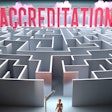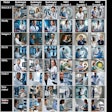
AuntMinnie.com is pleased to present the next installment of Leaders in Imaging, a series of interviews with individuals who are shaping the radiology landscape. We spoke with Kimlyn Queen, chair of the Radiology Administration Certification Commission (RACC) and director of imaging and cardiac cath services at Marion General Hospital in Ohio. The RACC oversees the Certified Radiology Administrator (CRA) program, which has reached its 10th anniversary since the date of the first exam.
AuntMinnie: Why was the CRA program established? What does it do?
 Kimlyn Queen, chair of the RACC.
Kimlyn Queen, chair of the RACC.
The CRA credential distinguishes people who have become experts in the field and affirms their skill sets and knowledge. It's come a long way over the past 10 years -- there are now more than 800 CRAs in the country -- and more and more people are starting to recognize the value of the exam. Having the certification gives potential employers a well-rounded picture of a radiology administrator's abilities, not just in imaging, but also in quality, operations, communications, human resources, customer service, and budgeting.
What is RACC's role in the program?
AHRA worked with Kodak to get a grant to start the program, but to make it valid, there has to be a separate credentialing body. The RACC was created to oversee the exam and certify its validity. And the CRA certification is now recognized by the American Registry of Radiologic Technologists, the American Society of Radiologic Technologists, and the American College of Radiology.
How does the credential set a radiology administrator apart from the competition?
I like to say that the CRA is to imaging what the CPA [certified public accountant] is to accounting. You want to know that your finances are being handled by an expert, and you want to know your department is, too.
It's no secret that healthcare has become a business. In my experience, people are shopping healthcare just like they would shop insurance or a new car. They're looking for the best experience for their money.
When a patient comes to your facility, they already expect competent, quality, safe care -- so what sets you apart from the guy across the street? A CRA stays current on what's going on in the healthcare world. They know what it means to bring quality to the patient experience, how to motivate their staff to do their best work, how to bring the best people into the department, how to address radiation dose concerns and so forth. They know the big picture, from both the patient side and the business side.
Who are CRAs?
The majority of the CRAs started as technologists, although we're seeing some people coming from a nursing background. We have a point system that determines eligibility to sit for the exam, and a candidate needs seven points, which are awarded according to the person's experience, education, and any other additional credentials. A new tech, or a tech with 10 years of experience but no leadership background, wouldn't necessarily be eligible to sit for the exam.
What are key issues for CRAs right now?
CRAs are focusing on reimbursement right now: what it's going to mean for the imaging enterprise, as well as what impact accountable care organizations and meaningful use could have. There are so many unknowns in the healthcare landscape, and one of the best things CRAs can do is to pay attention. [The Centers for Medicare and Medicaid Services' (CMS)] ICD-10 coding changes are coming in 2013, and departments have to be prepared for that.
In general, CMS has increased its quality measures and is tying reimbursement to them, tracking things like whether a facility has reduced readmissions for heart failure, or the number of falls or infections acquired at the facility. And there's also the agency's Hospital Consumer Assessment of Healthcare Providers and Systems program, under which patients are asked to rate their experience, and the hospital is then rated on these evaluations.
If you talk to any CRA, they will tell you this is important, since it's directly tied to how much money hospitals get reimbursed for patient care. Even though there may not be any radiology-specific questions on these surveys, patients' answers are just as important to radiology as they are to, say, nursing.
If a radiologic technologist already has a master's degree, why would he or she also need the CRA certification?
Having a master's is great; I have a master's of science in management and finance. However, having a master's degree doesn't necessarily mean that a person has all the skills or competencies to be a well-rounded leader in imaging. Having the CRA certification proves that you can put into daily application those skills that make for a good administrator. And it is a career booster: I started as a technologist, moved on to a management position, got the CRA certification, and became a director. There's a natural progression, and having the CRA demonstrates a person's competencies as an imaging leader and their commitment to lifelong learning.
One thing current CRAs can do is go out and share with human resource departments the importance of the credential, which includes lobbying for it to be included in job descriptions. And, of course, anyone interested in becoming a CRA can check out the website.




















